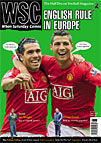 Once upon a time Chivas were just a Mexican club. Now they are part of an international branding exercise involving football, cola and dietry supplements, reports Martin del Palacio Langer
Once upon a time Chivas were just a Mexican club. Now they are part of an international branding exercise involving football, cola and dietry supplements, reports Martin del Palacio Langer
Football fans in Mexico were suspicious of Jorge Vergara when he announced his intention to buy the country’s most popular club, Chivas of Guadalajara, in 2002. Not least because his nutrition company, Omnilife, had sponsored Chivas’ arch-rivals Atlas the season before. When Vergara became interested, Chivas, whose large following stems from their policy of fielding only Mexicans, were in crisis. They were owned, like Barcelona, by their members, but for eight years had been run by a separate entity, the Promotora Deportiva Guadalajara, which initially injected large amounts of money but ran out of funds.
Vergara offered $600,000 for each member’s share, three hundred times the market value. Some resisted, arguing that Vergara did not have a football background, was not a fan of the team as he claimed and only wanted to buy the club to promote Omnilife. Opponents even brought a lawsuit against him, but Vergara gained enough support to take control. As an immediate effect of his association with Chivas, Omnilife dietary supplements became market leaders.
Outspoken and innovative, Vergara was a colourful figure on the Mexican football scene, loved by some and hated by others. He bought full-page ads in national papers taunting rival clubs and even challenged their presidents to bet on beating Chivas. He negotiated a five-year TV deal worth $65 million and announced that he would “clean” the team shirt by axing sponsors, but after two years he sold the space to Bimbo – a multi-national bakery – for $9.6m.
The new Dutch coach, Hans Westerhof, brought in a 3-5-2 system the team still use and restructured the youth academy to make it the country’s best. Chivas came to be known for spectacular football and their players became the core of the national team. They didn’t win the league until 2006, but they were runners-up once and twice reached the Copa Libertadores semi-finals.
Vergara still denies that football is being used as a platform for his products, but some of his actions suggest otherwise. In March 2003, coinciding with the boom of his business in Central America, Vergara bought Saprissa, Costa Rica’s most popular club, who were on the verge of bankruptcy. In four years he transformed them into the most powerful team in the region, winning three consecutive local titles and taking third place in the World Club Championship in 2005. That same year, Major League Soccer announced the creation of a new franchise: Chivas USA. They were the first team to be owned by an individual and not by the league itself. Vergara had taken advantage of the original club’s huge popularity in the southern United States.
After an uncertain start, the team qualified for the play-offs in 2007 and, with the creation of his American franchise, the US market opened up to Vergara’s products, which now include Chiva Cola and Tequilife, a non-alcoholic drink that supposedly tastes of tequila. All Omnilife products in Mexico, Costa Rica and the US carry the logo of the local Vergara-owned club.
In the past two years he has tried to buy three Spanish teams: Atlético Madrid, Racing Santander and Málaga. Although none of the negotiations bore fruit, he intends to buy a team in Spain before the end of the decade. Vergara has also been linked with teams in Germany and Universitario de Deportes, one of Peru’s two biggest clubs. On September 5, 2007, he announced the purchase of a team in Hefei, China, who will be known as Chivas and will play in the second division there. An Omnilife plant was set up in the city at the same time.
Vergara says that his ultimate aim is to own teams in all parts of the world to “promote spectacular football”. Will fans of struggling clubs accept a sugar-daddy if it means their team playing under the Chivas name and in their traditional red-and-white striped shirts? It seems unlikely, but it might be something for them to ponder over a glass of Chiva Cola and an Omnilife dietary supplement.
From WSC 256 June 2008